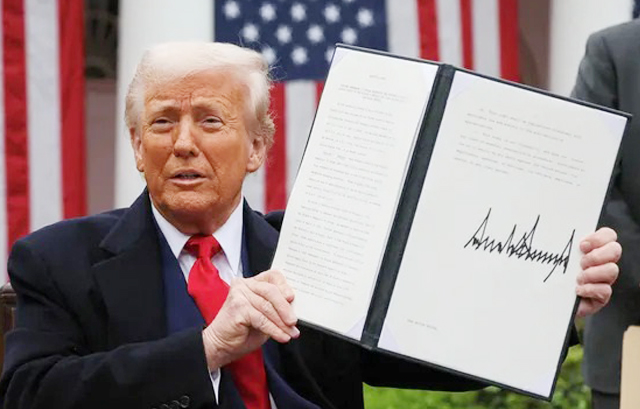By Nomfanelo Maziya | 2025-04-03

United States President Donald Trump has announced sweeping new import taxes on all goods entering the US, causing disruption of the international trade order since the post-World War Two era.
His plan establishes a baseline tariff of 10 per cent on all imports, fulfilling a key campaign promise from last year's White House race.
Furthermore, goods from approximately 60 trade partners, deemed "worst offenders" by the White House, including the European Union and China, will face significantly higher rates. Trump framed these increased tariffs as retaliation for perceived unfair trade policies.
The announcement has sent shockwaves through the global economy, with analysts predicting higher prices for American consumers and a slowdown in US economic growth.
Concerns are also mounting that some nations could be pushed into recession as a result of the escalating trade tensions.
This dramatic shift in US trade policy raises questions about the future of existing trade relationships, including that of Eswatini.
Currently, Eswatini's primary exports to the United States include Raw Sugar ($25 million), Other Processed Fruits and Nuts ($1.82 million), and Knit T-shirts ($1.26 million).
Over the past five years, Eswatini's exports to the U.S. have demonstrated a steady growth trajectory, increasing at an annualized rate of 4.76%, from $13.6 million in 2018 to $31.5 million in 2023.
However, the newly imposed U.S. tariffs, particularly the baseline 10 per cent tariff, could potentially impact Eswatini's export competitiveness.
While the specific rates applied to Eswatini are not explicitly detailed in the initial announcement, the general shift towards protectionism signals a potential challenge for Eswatini's exporters.
The global response to Trump's tariffs has been swift and critical.
China's Ministry of Commerce has condemned the "unilateral bullying practices" and vowed "resolute counter-measures."
The European Union is also preparing retaliatory measures if negotiations fail. European Commission President Ursula von der Leyen described the move as a major blow to the world economy.
The White House clarified that the tariff rate on Beijing is in addition to existing 20 per cent tariffs, bringing the total tariff rate on Chinese imports to a staggering 54 per cent. Other countries facing steep tariffs include Vietnam (46 per cent) and Taiwan (32 per cent).
50 African countries specifically named in President Trump's Tariff Trawl:
South Africa: 30%
Madagascar: 47%
Tunisia: 28%
Egypt: 10%
Botswana: 37%
Morocco: 10%
Algeria: 30%
Lesotho: 50%
Mauritius: 40%
Kenya: 10%
Nigeria: 14%
Namibia: 21%
Ethiopia: 10%
Togo: 10%
Ghana: 10%
Angola: 32%
DRC: 11%
Mozambique: 16%
Zambia: 17%
Tanzania: 10%
Senegal: 10%
Cameroon: 11%
Uganda: 10%
Gabon: 10%
Malawi: 17%
Liberia: 10%
Zimbabwe: 18%
Benin: 10%
Rep. of Congo: 10%
Djibouti: 10%
Rwanda: 10%
Sierra Leone: 10%
Eswatini: 10%
Sudan: 10%
Niger: 10%
Equatorial Guinea: 13%
Libya: 31%
Guinea: 10%
Chad: 13%
Mali: 10%
Cabo Verde: 10%
Burundi: 10%
Mauritania: 10%
Gambia: 10%
Eritrea: 10%
South Sudan: 10%
Guinea Bissau: 10%
Central African Republic 10%
Sao Tome and Principe 10%
Comores 10%
share story
Post Your Comments Below
All material © Swazi Observer. Material may not be published or reproduced in any form without prior written permission.
Design by Real Image Internet